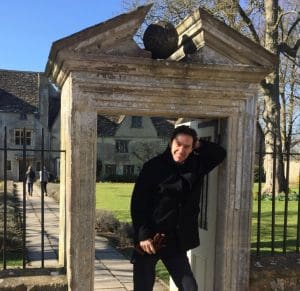 Tell us about yourself and how many books you have written.
Tell us about yourself and how many books you have written.
I grew up in Kent, moved off to university where I met my wife Helen. We brought our children up in South West London and since they’ve grown up we’ve travelled widely for work and pleasure. Last year we spent time volunteering in Myanmar and Nepal for VSO.
Everything I write you can call Narrative Non-fiction, that is true stories with a narrative that carries the reader forward. The three previous books related to my work as a coaching psychologist who specialises in organisational development: “Diary of a Change Agent” (1996, Gower), “From Hippos to Gazelles: How Leaders Create Leaders” (2008, Kingsham/British Council) and “Creating Leadership” (2018, BEP).
What is the name of your latest book and what inspired it?
“Secret Box: Searching for Dad in a Century of Self”, is the true story of a psychologist who takes off his professional hat and returns to his ‘60s childhood. This is a quest to solve the mystery of what happened to a father and a family.
It was inspired by the wish to break a deafening silence and the question of what happens during a childhood to drive someone to become a psychologist.
Do you have any unusual writing habits?
On waking, I listen for thoughts: sometimes they are clear as a bell. I like to write them down, and I also like to write freely in my journal. It feels therapeutic. It’s surprising what arrives on the page. Like tinkling the piano keys and listening for a tune. To write Secret Box, I delved into my father’s old diaries, letters and photographs; and made visits to collect family recollections. I attended a creative writing workshop at CityLit in London to get over some writing blocks and polish the craft by reading out stories. This gives you all kinds of feedback.
Writing this stretched me to be a detective, a historian, a dramatist as well as a psychologist.
What authors, or books have influenced you?
Chimamanda Ngozi Adichie. Arundhati Roy. Barbara Kingsolver. William Boyd. Frank McCourt. Franz Kafka. Barack Obama. I sit amidst piles of books because the overloaded wall-mounted shelves are collapsing onto the desks below. Many are esoteric, on psychology and a “century of self” that began with Sigmund Freud. There’s a pile devoted to the Human Potential Movement of the 1960s in which my father became entangled.
What are you working on now?
I’m taking a rest after three years writing and re-writing Secret Box. One thing coming up is I’ve been asked to run a workshop on Writing To Reconnect giving those present a taste of the methods I employed during the writing Secret Box. The challenge will be to put this cogently and practically.
What is your best method or website when it comes to promoting your books?
I’m learning as I go, aiming for reviews of the eBook as an interest raiser for the paperback which launches on 20th April 2018. The Awesome Gang here looks like an interesting one. Amazon and Goodreads are amazing, I’m tinkering with Twitter and Facebook, and connecting with my professional community in LinkedIn. There’s also a video uploaded to Vimeo. Right not it all feels as jumbled up as a bowl of spaghetti.
Do you have any advice for new authors?
Write your story. Go to a writing class and ask for feedback. Write down what they appreciated. Don’t let the critics put you off.
What is the best advice you have ever heard?
The compulsion to write is what about something is what sets you apart. Armed with that you can learn all the skills you need.
What are you reading now?
I’m looking forward to reading books about fathers and sons that I held back from until I finished the last book.
What’s next for you as a writer?
Nothing different. Just keep on downloading my early morning thoughts, writing freely and paying attention to what lands on the page. Perhaps I’ll write about some of the volunteering. Perhaps I’ll find other writers drawn to write narrative non-fiction and we can exchange notes.
If you were going to be stranded on a desert island and allowed to take 3 or 4 books with you what books would you bring?
On top of Shakespeare and the Bible? The Little Prince. The Origin of Species by Charles Darwin. And the latest William Boyd.
Author Websites and Profiles
Tony Page Amazon Profile
Tony Page’s Social Media Links
Goodreads Profile
Twitter Account